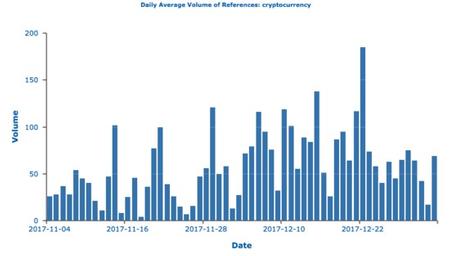
My first trend update of the year focuses on the fast-growing cryptocurrency market. As of today the market is worth more than $700 billion USD. The most famous cryptocurrency is, of course, Bitcoin, but there have always been others—and they are starting to gain prominence and (slowly) entering the world of health, medicine and wellness. Grounded in blockchain technology, cryptocurrencies are digital assets that can be: Cryptocurrencies matter not only for their functional value, but they are also regularly exchanged on secondary markets and sometimes sharply increase in value based on speculation, when companies behind them achieve specific milestones or other factors. As outlined in the chart below, we've seen a sharp uptick in mentions of cryptocurrencies in the DigiHealth Informer emerging technology database over the last few months. Source: DigiHealth Informer, Keyword: Cryptocurrency, Search Time Frame: November 2017 - January 2018 Increasingly, I've been seeing digital health companies develop blockchain-based solutions that utilize cryptocurrencies, and even deploy pilot projects with health organizations. Some of these include: This is a fascinating area that will only receive increased attention over the next year. Stay tuned. This blog was first published by DigiHealth Informer.

Thoughtful Marketers Acknowledge That the Holidays Aren’t All Cheer
October 28, 2025
For CMOs, the Market Stays Open During the Shutdown
October 06, 2025
How Should Companies Approach Reputation Building in the AI Era?
August 15, 2025
Short Cuts: Tariffs Lurk, Marketers Lead
June 14, 2025
